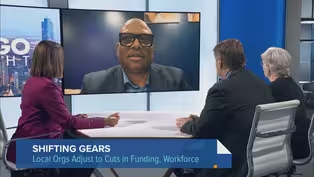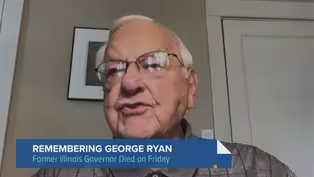
New Book Examines Causes of Gun Violence
Clip: 5/5/2025 | 8m 28sVideo has Closed Captions
The U.S. gun homicide rate is 26 times higher than other developed countries.
For decades, conservatives and liberals have fiercely debated what drives the nation's gun violence epidemic. A new book called "Unforgiving Places: The Unexpected Origins of American Gun Violence" says neither side has it right.
Problems playing video? | Closed Captioning Feedback
Problems playing video? | Closed Captioning Feedback
Chicago Tonight is a local public television program presented by WTTW
WTTW video streaming support provided by members and sponsors.

New Book Examines Causes of Gun Violence
Clip: 5/5/2025 | 8m 28sVideo has Closed Captions
For decades, conservatives and liberals have fiercely debated what drives the nation's gun violence epidemic. A new book called "Unforgiving Places: The Unexpected Origins of American Gun Violence" says neither side has it right.
Problems playing video? | Closed Captioning Feedback
How to Watch Chicago Tonight
Chicago Tonight is available to stream on pbs.org and the free PBS App, available on iPhone, Apple TV, Android TV, Android smartphones, Amazon Fire TV, Amazon Fire Tablet, Roku, Samsung Smart TV, and Vizio.

WTTW News Explains
In this Emmy Award-winning series, WTTW News tackles your questions — big and small — about life in the Chicago area. Our video animations guide you through local government, city history, public utilities and everything in between.Providing Support for PBS.org
Learn Moreabout PBS online sponsorship>> The U.S. gun homicide rate is 26 times higher than other developed countries for decades.
Conservatives and liberals have fiercely debated what drives the nation's gun violence epidemic.
But a new book called Unforgiving Places.
The unexpected origins of American gun violence says neither side has a quite right and suggests a new pathway to stop these acts of violence before they start.
Joining us now is yen's lead big move.
It WIC director at the University of Chicago Crime Lab.
I apologize in the author of Unforgiving Places.
Thank you so much.
For you explain.
There are sort of 2 types of conventional wisdom about what causes gun violence.
What are those yet?
So I think the main argument, book is that we haven't made more progress on this problem of gun violence in America.
>> Because we've largely misunderstood conventional wisdom on the right for a long time.
He's been that gun violence is due to morally bad people who aren't afraid of whatever the criminal justice system is going to do to them.
>> And that leads you to think that the only solution is to disincentivize gun violence by threatening people with bigger criminal justice sticks.
On the left.
Most people think the problem of gun violence is mostly due to bad economic conditions.
People just desperate to feed themselves to feed their families and lovely to think that the only thing you can do to address the problem, he's to disincentivize it by improving the alternatives to crime, jobs programs and social social programs.
And the thing that the left and the right, even though they disagree on so many different things.
The thing that the left and the right implicitly agree on here is that before anybody pulls the trigger, they're thinking carefully about the pros and cons, the consequences what's going to happen before they do it.
And that's not what most gun Violence in Chicago or in America more generally.
You know, when you look at most shootings in the city, you can see that most of them are in their arguments.
The crimes of passion, not crimes, a profit recognizing that range is one of the most powerful of all human passions.
So it's it's time in the spur of the moment thinking that I go sideways and ends in a tragedy because someone's got a gun.
And that's not the moment when any of us are really responding.
New incentives very much.
We often hear acpd referring to as a beef, right, like a beast that that just escalates and gets out of hand and before you know it so much because someone in that beat had a gun.
>> We have the tragedies that we that we talk about so much.
Cdc data shows that there was a 44% increase in firearm related homicides nationally between March 2020 in October 2021, why did we see those high numbers during the pandemic?
Yeah, I think what we saw during the pandemic, I think it's very consistent with this idea that most gun violence is is arguments not economically motivated, premeditated.
You know, if you >> think about what we all saw over the course the COVID pandemic.
There were a bunch of things that made very clear that the cold that the pandemic put everybody on edge.
You know, you remember before the pandemic, we were not in the world in which videos of people punching each other out on plans was a regular thing right?
Motor vehicle accidents skyrocketed during the pandemic as well.
And I think rise in shootings was very much of of that pattern as well.
The book addresses the ripple effect that gun violence can have on different cities.
What's the impact of gun violence on cities?
Populations?
>> Yeah, I've I've really come to think of gun violence as the problem that sits upstream and every other challenge that cities like Chicago face.
Oh, my University of Chicago colleague Steve Levitt wrote a paper many years ago that showed that every murder that happens in a city reduces the city's population on I-70, people.
So that's fewer people moving in and more people moving out you know, I don't know how many people know this, but the city of Chicago has lost fully million people since 1958.
That's a lot of people now gun violence is not the only thing that's causing people to leave the city.
But as one of them really important drivers and when a city loses a million people that makes everything else in the city is trying to do so much harder, right?
It makes it harder to pay for schools for better mental health services for economic development A Kuala Cross, the south and West sides.
And so I think I really come to think that solving to gun violence problem is just so important for making it possible to solve these other city challenges.
He also argued that the term crime is unhelpful.
What's wrong with that word?
Yeah, I think crime to me is as unhelpfully broad is the word disease.
You know, if you think about how big of a problem is disease or what we do to solve disease?
depends on whether we're talking about pneumonia versus cancer versus COVID versus something else.
Right.
And I think similarly, you know, crime captures everything from jaywalking in shoplifting to murder.
And I think the term just leads us to be very confused about what the problem is that we're talking about and what the solution is that we should be thinking about because they're very different across different types of crops.
And you write that up, of course, because of that spectrum, right while shoplifting in some of these quality of life crimes aren't great.
They're bad.
Murder is a completely different sort of level of devastation.
And the thing that we know the the public cares most about from the public's perspective, gun violence is the crime problem.
This is something that you can see very clearly in the data over and over again.
You also proposed solutions.
>> What are some of those?
Yeah, I think the way that I've come to think of for 100 years, we thought about the problem is being all about changing incentives, right?
And I think we very, very different approach and the way that I came start thinking very differently about solutions was I was in the juvenile detention center on the west side of Chicago many years ago talking to a Steph leader there.
He said he always tells the kids in there.
If I could give you back 10 minutes of your lives, none of you would be here.
I think that's a very, very profound kind of reframing about the nature of the problem that we're trying to solve.
And so I think there 2 sorts of things that we can do to solve the problem.
One is we've learned a lot over the last several years about what sorts of social programs can change, what kids bring with them into these really difficult 10 minute windows and very unforgiving neighborhood environments right time, help them better navigate these hard situations.
And the other thing that we can do is we can make situations that so many kids in cities like Chicago face much more forgiving.
You know, part of that is what we think of normally as part of the criminal justice systems response to gun violence like police and community violence, intervention, nests, but also things that you wouldn't even think of as being related to gun violence and also things like zoning stores in neighborhoods cleaning up abandoned lots and turning them into pocket parks.
All of those sorts of urban design, things create more of what urban planners call eyes on the street that turned out to be remarkably helpful and remarkably important in getting other adults around to interrupt young people when they're in these 10 minute windows that can sometimes escalate tragedy.
And you say that like each of those steps, while one of them might reduce crime by 20% and another by 30% may not sound like a lot.
But before, you know, you've added a pallet of potential Exactly.
I think one of the key things that I've come to realize about this problem is like we're never going to have like the polio vaccine for gun violence.
There's never going to be one single thing that you push that button and the violence goes away.
I can.
Progress is gonna be like the way we made progress on reducing motor vehicle deaths.
I think it's going to be doing a bunch of things that each address, the problem by 10, 2030%.
And you add that up and you're talking about transformative change.
We've got 30 seconds left because one of the things that you mentioned do you explain that addressing the proliferation of guns in this country?
It's highly unlikely.
Yeah, a I think, you know, where 400 million guns in the country, 330 million people go.
There's guns are going anywhere I think the key point, the book is optimistic.
Gun violence is guns islands.
If the gun situation in America isn't changing anytime soon.
The good news is that we have another path to make real progress on this, which is to reduce the willingness of people to use guns to hurt one another a world that we're just saturated with And you also say it costs next to nothing a lot less if you can implement some of these.
And obviously worth the return on investment for whatever, whatever it is.
Alright, guns, Lou big, thank you so much for
Chicago Groups Feeling the Impact of AmeriCorps Cuts
Video has Closed Captions
Clip: 5/5/2025 | 9m 42s | AmeriCorps was directed to terminate nearly $400 million in grants. (9m 42s)
Remembering George Ryan, Ex-Governor With Complicated Legacy
Video has Closed Captions
Clip: 5/5/2025 | 2m 31s | The former governor died Friday at his home. He was 91. (2m 31s)
Providing Support for PBS.org
Learn Moreabout PBS online sponsorshipSupport for PBS provided by:
Chicago Tonight is a local public television program presented by WTTW
WTTW video streaming support provided by members and sponsors.













